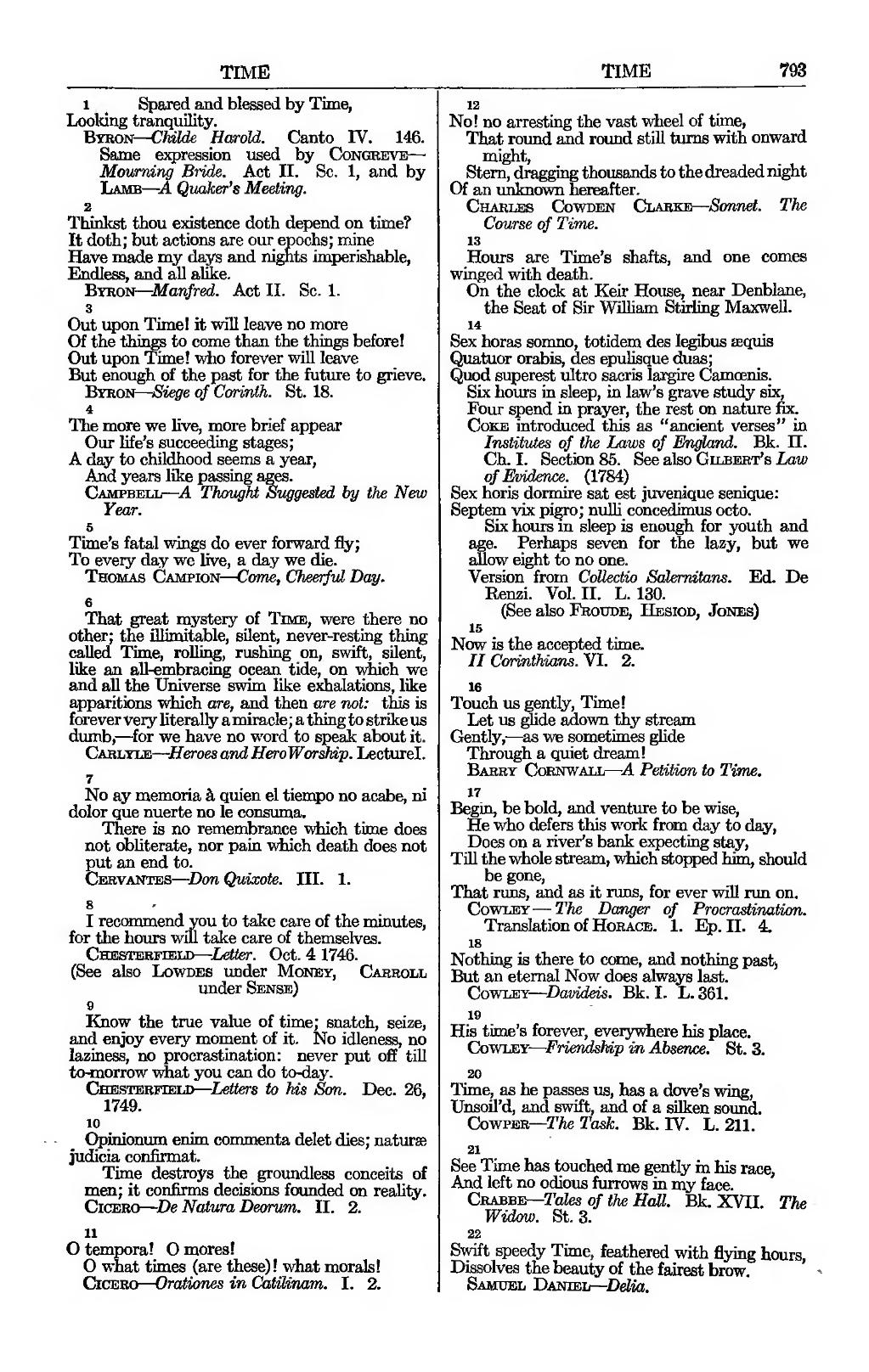TIME
Spared and blessed by Time,
Looking tranquility.
Byron—Childe Harold. Canto IV. 146. Same expression used by Congreve—Mourning Bride. Act II. Sc. 1, and by Lamb—A Quaker's Meeting.
Thinkst thou existence doth depend on time?
It doth; but actions are our epochs; mine
Have made my days and nights imperishable,
Endless, and all alike.
| author = Byron
| work = Manfred. Act II. Sc. 1.
Out upon Time! it will leave no more
Of the things to come than the things before!
Out upon Time! who forever will leave
But enough of the past for the future to grieve.
| author = Byron
| work = Siege of Corinth. St. 18.
The more we live, more brief appear
Our life's succeeding stages;
A day to childhood seems a year,
And years like passing ages.
Campbell—A Thought Suggested by the New
Year.
Time's fatal wings do ever forward fly;
To every day we live, a day we die.
Thomas CAMPioN—Come, Cheerful Day.
That great mystery of Time, were there no
other; the illimitable, silent, never-resting thing
called Time, rolling, rushing on, swift, silent,
like an all-embracing ocean tide, on which we
and all the Universe swim like exhalations, like
apparitions which are, and then are not: this is
forever very literally a miracle ; a thing to strike us
dumb,—for we have no word to speak about it.
Cablyle—Heroes and HeroWorship. Lecturel.
No ay memoria a quien el tiempo no acabe, ni
dolor que nuerte no le consuma.
There is no remembrance which time does
not obliterate, nor pain which death does not
put an end to.
| author = Cervantes
| work = Don Quixote.
| place = III. 1.
I recommend you to take care of the minutes,
for the hours will take care of themselves.
Chesterfield—Letter. Oct. 4 1746.
| seealso = (See also Lowdes under Money, Carroll under Sense)
| topic = Time
| page = 793
}}
{{Hoyt quote
| num =
| text = <poem>Know the true value of time; snatch, seize,
and enjoy every moment of it. No idleness, no
laziness, no procrastination: never put off till
to-morrow what you can do to-day.
Chesterfield—Letters to his Son. Dec. 26,
1749.
Opinionum enim commenta delet dies; naturae
judicia confirmat.
Time destroys the groundless conceits of
men; it confirms decisions founded on reality.
Cicero—De Natura Deorum. II. 2.
O tempora! O mores!
O what times (are these)! what morals!
Cicero—Orationes in Catilinam. I. 2.
TIME
No! no arresting the vast wheel of time,
That round and round still turns with onward
might,
Stern, dragging thousands to the dreaded night
Of an unknown hereafter.
Charles Cowden Clarke—Sonnet. The
Course of Time.
Hours are Time's shafts, and one comes
winged with death.
On the clock at Keir House, near Denblane,
the Seat of Sir William Stirling Maxwell.
Sex horas somno, totidem des legibus aequis
Quatuor orabis, des epulisque duas;
Quod superest ultro sacris largire Camoenis.
Six hours in sleep, in law's grave study six,
Four spend in prayer, the rest on nature fix.
Coke introduced this as "ancient verses" in
Institutes of the Laws of England. Bk. II.
Ch. I. Section 85. See also Gilbert's Law
of Evidence. (1784)
Sex horis dormire sat est juvenique senique:
Septem vix pigro; nulli concedimus octo.
Six hours in sleep is enough for youth and
age. Perhaps seven for the lazy, but we
allow eight to no one.
Version from Collectio Sahrnitans. Ed. De
Renzi. Vol. II. L. 130.
| seealso = (See also Erodde, Hesiod, Jones)
| topic = Time
| page = 793
}}
{{Hoyt quote
| num =
| text = <poem>Now is the accepted time.
// Corinthians. VI. 2.
Touch us gently, Time!
Let us glide adown thy stream
Gently,—as we sometimes glide
Through a quiet dream!
Barry Cornwall/—A Petition to Time.
Begin, be bold, and venture to be wise,
He who defers this work from day to day,
Does on a river's bank expecting stay,
Till the whole stream, which stopped him, should
be gone,
That runs, and as it runs, for ever will run on.
Cowley—The Danger of Procrastination.
Translation of Horace. 1. Ep. II. 4.
Nothing is there to come, and nothing past.
But an eternal Now does always last.
Cowley—Davideis. Bk. I. L. 361.
His time's forever, everywhere his place.
Cowley—Friendship in Absence. St. 3.
Time, as he passes us, has a dove's wing,
Unsoil'd, and swift, and of a silken sound.
See Time has touched me gently in his race,
And left no odious furrows in my face.
Crabbe—Tales of the Hall. Bk. XVII. The
Widow. St. 3.
Swift speedy Time, feathered with flying hours,
Dissolves the beauty of the fairest brow.
Samuel Danteij—Delia.
